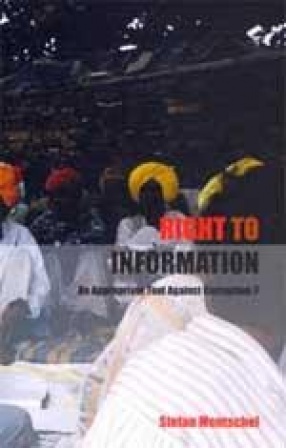Right to Information: An Appropriate Tool against Corruption?
Synopsis
Every year the Indian government spends millions of rupees on the developments of the country’s rural regions – for the construction of roads and canals, for the renovation of schools and hospitals, for emergency help programmes. The aim is to improve the living standards of the rural population. But major parts of the planed infrastructure projects are usually never completed; schools and hospitals in the villages are in poor condition and commodities do not reach the needy. Influential politicians, bureaucrats and the local elite are often the beneficiaries, using this public money for their private good. Their corrupt networks undermine the aims of state development policy. The late Prime Minister Rajiv Gandhi said already in 1988 that out of each rupee which is spent on rural development, only 17 paise reach the concerned people. Due to its vast extent, many people in India have accepted corruption as an unavoidable, almost ‘natural’ occurrence in society. ‘But the fact, ’say human rights activists, ‘that corruption always happens at the cost of the poor, makes it most important to fight it.’ And something can be done. Since the beginning of the 1990s the Mazdoor Kisan Shakti Sangathan (MKSS) is fighting against corruption and the social inequalities related to it in rural Rajasthan. Very early on, the demand for Right to Information (RTI) was identified as a main focus of the organization’s work. Because when people understand political and administrative procedures, and when they involve themselves in these procedures, then only can they confront corruption. People’s participation in governance, government’s accountability to the public and transparency in government – this is what Right to Information is all about. And the MKSS has shown ways how to make use of it. Right to Information was nothing new when the MKSS took it up. But in the United States or Europe, it was discussed mainly as an academic problem and not as a social issue. It was in India that RTI took on a social and developmental dimension as well; and this particularly because the campaign triggered off by the MKSS started from the grass-roots-level. This book probes into the MKSS’ struggle in Rajasthan without neglecting its importance in the wider context of Right to Information. Chapter 1 deals with the theoretical basis of the RTI concept and gives an overview of the world-wide RTI debate. Chapter 2 looks into the conceptual meaning of corruption and the functioning of Indian state development policy. It shows how corruption ‘works’ in this context and how it influences the everyday life of the people. Chapter 3 is devoted to the Indian RTI movement. History, ideology as well as methods of MKSS’ political struggle are discussed. It also deals with the legal situation, where legislations are examined for their quality and enforceability. We also look briefly into Right to Information’s importance for other political contexts like the Right to Food or the Right to Vote. Finally, we deal with the questions if Right to Information can be an appropriate and effective method to struggle against the vast problem of corruption and how it could be made an integral part of democratic practice in the Republic of India.
Read more
12.60
11.34
$
14.00 $
Free delivery Wolrdwidе in 10-18 days
Ships in 1-2 days from New Delhi
Membership for 1 Year $35.00
Get it now and save 10%
Get it now and save 10%
BECOME A MEMBER







Bibliographic information